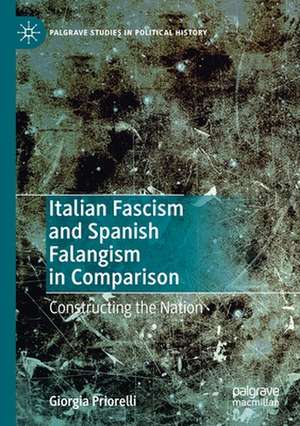Italian Fascism and Spanish Falangism in Comparison: Constructing the Nation: Palgrave Studies in Political History
Autor Giorgia Priorellien Limba Engleză Paperback – 2 iul 2021
| Toate formatele și edițiile | Preț | Express |
|---|---|---|
| Paperback (1) | 637.46 lei 6-8 săpt. | |
| Springer International Publishing – 2 iul 2021 | 637.46 lei 6-8 săpt. | |
| Hardback (1) | 641.71 lei 6-8 săpt. | |
| Springer International Publishing – 2 iul 2020 | 641.71 lei 6-8 săpt. |
Din seria Palgrave Studies in Political History
- 15%
 Preț: 700.61 lei
Preț: 700.61 lei - 15%
 Preț: 707.46 lei
Preț: 707.46 lei - 15%
 Preț: 644.82 lei
Preț: 644.82 lei - 15%
 Preț: 696.50 lei
Preț: 696.50 lei - 18%
 Preț: 783.50 lei
Preț: 783.50 lei - 18%
 Preț: 779.89 lei
Preț: 779.89 lei - 18%
 Preț: 778.94 lei
Preț: 778.94 lei -
 Preț: 382.36 lei
Preț: 382.36 lei - 18%
 Preț: 725.43 lei
Preț: 725.43 lei -
 Preț: 482.35 lei
Preț: 482.35 lei - 18%
 Preț: 782.42 lei
Preț: 782.42 lei - 18%
 Preț: 780.37 lei
Preț: 780.37 lei - 18%
 Preț: 889.12 lei
Preț: 889.12 lei - 18%
 Preț: 938.51 lei
Preț: 938.51 lei -
 Preț: 356.49 lei
Preț: 356.49 lei - 18%
 Preț: 780.37 lei
Preț: 780.37 lei - 18%
 Preț: 897.02 lei
Preț: 897.02 lei
Preț: 637.46 lei
Preț vechi: 749.95 lei
-15% Nou
Puncte Express: 956
Preț estimativ în valută:
121.98€ • 130.44$ • 101.70£
121.98€ • 130.44$ • 101.70£
Carte tipărită la comandă
Livrare economică 17 aprilie-01 mai
Preluare comenzi: 021 569.72.76
Specificații
ISBN-13: 9783030460587
ISBN-10: 3030460584
Pagini: 239
Ilustrații: XI, 239 p. 1 illus.
Dimensiuni: 148 x 210 mm
Greutate: 0.34 kg
Ediția:1st ed. 2020
Editura: Springer International Publishing
Colecția Palgrave Macmillan
Seria Palgrave Studies in Political History
Locul publicării:Cham, Switzerland
ISBN-10: 3030460584
Pagini: 239
Ilustrații: XI, 239 p. 1 illus.
Dimensiuni: 148 x 210 mm
Greutate: 0.34 kg
Ediția:1st ed. 2020
Editura: Springer International Publishing
Colecția Palgrave Macmillan
Seria Palgrave Studies in Political History
Locul publicării:Cham, Switzerland
Cuprins
1 Introduction.- 2 The Ideology of the Nation in Fascism and Falangism.- 3 The Imperial Destiny of the Nation.- 4 On Race and Nation: Certainties and Changing Definitions.- 5 The Arbiters of Post-War Europe: Fascist and Falangist Nations in the New Nazi Continental Order.- 6 Conclusions.
Notă biografică
Giorgia Priorelli holds a PhD in Political History from LUISS Guido Carli in Rome, Italy. Her main research interests are nationalism and fascism in comparative and transnational perspective, with a particular focus on Italy and Spain. She has been a visiting fellow at the European University Institute of Florence, Durham University, the University of Valencia and the IMT Institute for Advanced Studies in Lucca. Her publications include contributions to edited volumes and journal articles.
Textul de pe ultima copertă
'Giorgia Priorelli has made a welcome contribution to the burgeoning field of comparative fascist studies by carrying out a sustained and highly accessible comparison of the ultranationalisms of the Spanish Falange and Italian Fascism, and then showing how they helped shape basic policies and utopian expectations relating to imperialism, race, and the Nazis’ New European Order.'
–Roger Griffin, author of The Nature of Fascism (1991) and Fascism (2018)
This book compares the Italian Fascist and the Spanish Falangist political cultures from the early 1930s to the early 1940s, using the idea of the nation as the focus of the comparison. It argues that the discourse on the nation represented a common denominator between these two manifestations of the fascist phenomenon in Mussolini’s Italy and Franco’s Spain. Exploring the similarities and differences between these two political cultures, this study investigates how Fascist and Falangist ideologues defined and developed their own idea of the nation over time to legitimise their power within their respective countries. It examines to what extent their concept of the nation influenced Italian and Spanish domestic and foreign policies. The book offers a four-level framework for understanding the evolution of the fascist idea of the nation: the ideology of the nation, the imperial projects of Fascism and Falangism, race and the nation, and the place of these cultures in the new Nazi continental order. In doing so, it shows how these ideas of the nation had significant repercussions on fascist political practice.
Giorgia Priorelli holds a PhD in Political History from LUISS Guido Carli in Rome, Italy. Her main research interests are nationalism and fascism in comparative and transnational perspective, with a particular focus on Italy and Spain. She has been a visiting fellow at the European University Institute of Florence, Durham University, the University of Valencia and the IMT Institute for Advanced Studies in Lucca. Her publications include contributions to edited volumes and journal articles.
Caracteristici
Offers an innovative comparison of Mussolini’s Italy and Franco’s Spain Takes the idea of nation as the common feature of both regimes to explore the similarities and differences between their fascist political cultures Contributes to the growing body of research on interwar dictatorships and the transnational fascist phenomenon
